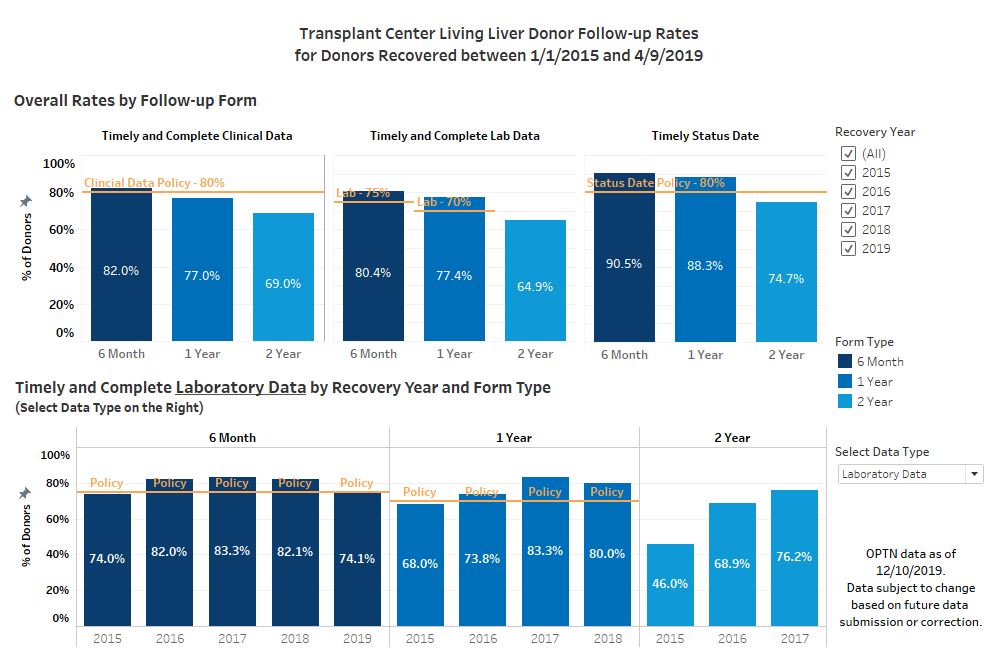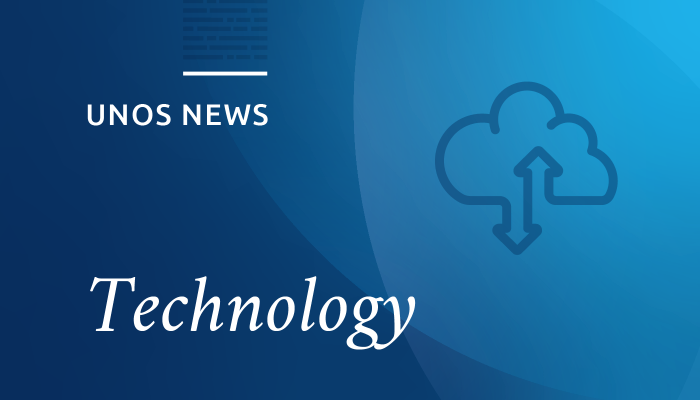The new business intelligence and data products team at UNOS is building effective, efficient and user-friendly data products for the transplant community and members of the Organ Procurement and Transplantation Network. All business intelligence work – from static reports to self-exploratory maps and dashboards – provides solutions through the use of data.
New in the data services portal
- Liver living donor follow-up report
Launched the week of Dec. 17, 2019, the liver living donor follow-up report has been released to all transplant programs. The new tool is located in the visual analytics section of the data services portal and aims to provide centers with an assessment of their compliance with the liver donor follow-up data, or LDF, elements named in OPTN policy 18.5. The liver living donor follow-up report includes both overall and form-level liver LDF information, similar to the existing kidney living donor follow-up report. The tool also includes a list of LDFs that will be generated in the next 12 months so that members can proactively schedule their donor follow-ups.

The liver living donor follow-up report has been released to all transplant programs and is located in the visual analytics section of the data services portal.
Recently updated
- Kidney living donor follow-up report
The excel version of the kidney living donor follow-up report will be suspended after its March 2020 update. The excel is being replaced by the interactive living kidney donor follow-up report that is currently available in the visual analytics section of the data portal. Recent users of the excel report will be emailed with more information about the interactive version, including the steps required to download the data into excel.
The interactive version of this tool continues to be available to all transplant programs, and its data is now updated weekly instead of monthly. A new documentation tab explains the data elements required by OPTN Policy 18.5.
- Kidney paired donation data dashboard
This tool now has a map of centers that have participated in kidney paired donation, or KPD, match runs in the past year.
- Kidney waiting list management tool
This tool is widely used and currently available to all transplant centers. The UNOS business intelligence team has incorporated a frequent member request to make the data download process easier. Other changes involve updated formatting, including fonts and tooltips. TThe dashboard includes weekly snapshots for three months, and then monthly data for the previous three years.For more details about these enhancements, see the documentation page within the tool.
Coming in January 2020
- Organ offers report TXC
Changes are coming to this tool, which is currently available to all transplant centers and found in the visual analytics section of the data services portal. Based on member feedback, the changes may include a high-level overview of the number of offers a center has received, a new candidate age filter, more information on the candidate match lists, a new “select all” download option on the match lists, a new built-in documentation page, and formatting changes. UNOS is not changing the report of organ offers, or ROO, dataset at this time, and the report still includes six months of a program’s offers. If your program is interested in testing future product updates, please email [email protected] to let the data products team know which products you are most interested in testing.
- Organ offers report OPO in visual analytics
Currently available to all organ procurement organizations, the report is scheduled to lose its “download full data” option on Jan 6, 2020. If members use this visual report to access the full data, they are encouraged to email [email protected]; member feedback will help the business intelligence team design that data more thoughtfully into the product.
The business intelligence team is eager to work directly with members while developing products and revamping the existing catalogue. To submit feedback on any of the data portal tools, or to submit ideas for new tools, please email [email protected].

